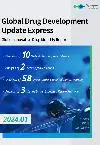Gilead calls dibs on a PhI bispecific, hands over $60M to cash-strapped MacroGenics
17 Oct 2022
CollaborateAntibodyADC
On a continual search for more baskets to put its oncology eggs in, Gilead has landed on a hot target: CD123.
Specifically, Gilead is grabbing a bispecific antibody from MacroGenics, a seasoned biotech player that’s seen its share of setbacks. For $60 million upfront, Gilead buys an exclusive option to license MGD024 after MacroGenics wraps up the ongoing Phase I study and calls dibs on two other early-stage bispecific research programs.
The whole deal, inclusive of target nomination, option fees and milestones, can add up to $1.7 billion.
For MacroGenics, that represents significant cash infusion “as cash runway has been weighing on the stock,” SVB Securities analyst Jonathan Chang wrote in a note.
CD123 has been pursued by multiple drugmakers as a promising target for hematologic cancers such as acute myeloid leukemia and myelodysplastic syndromes — and tripped some of them up. Because CD123 also sits on healthy cells, the therapeutic window is relatively narrow, which can present challenges when it comes to dosing frequency.
MacroGenics’ MGD024 is made on its DART platform, which it says produces molecules with more stable structure. Like most cancer-killing bispecifics, it binds to a tumor antigen on one side and CD3 on T cells on the other; but according to the company, its CD3 component is designed to minimize cytokine release syndrome, thus lowering toxicity.

Preview
Source: Endpts
“We believe MGD024, with its potential to reduce CRS and permit intermittent dosing through a longer half-life, could translate to more patient-friendly dosing and enhanced clinical outcomes for people living with AML and MDS,” said Bill Grossman, Gilead’s senior vice president, oncology clinical development.
Gilead, which boasted about a network of 30 oncology partners in April, has continued to grow the cancer pipeline in pursuit of a goal to accrue more than 20 indication approvals by 2030. In a recent pact, it wagered $300 million cash on Dragonfly’s 5T4-targeting therapy designed to drag natural killer — NK cells — along with other cancer killing T cells into the tumor microenvironment.
Gilead joins a lineup of Big Pharma partners betting big on TriNKETs, with a $300M cash ante to get started on a 5T4
As Chang of SVB Securities noted, MGD024 is actually MacroGenics’ second CD123xCD3 bispecific after the company discontinued a first-gen compound dubbed flotetuzumab earlier this year.
While MacroGenics once soared on high expectations for its HER2 drug Margenza, which won a head-to-head against Roche’s top-selling Herceptin in progression-free survival, the commercialization effort proved barren. Final results from the trial suggesting Margenza performed worse than Herceptin on overall survival didn’t help — and total 2021 sales were only $12.3 million.
It was so strapped for cash that execs noted in a recent earnings call they didn’t have enough money to fund a Phase II/III study for the lead experimental drug, the antibody-drug conjugate MGC018, in prostate cancer. The latest cash infusion may boost investors’ confidence that they will find the money, as promised, to begin the trial later this year.
For more details,please visit the original website
The content of the article does not represent any opinions of Synapse and its affiliated companies. If there is any copyright infringement or error, please contact us, and we will deal with it within 24 hours.
Organizations
Drugs
Hot reports
Get started for free today!
Accelerate Strategic R&D decision making with Synapse, PatSnap’s AI-powered Connected Innovation Intelligence Platform Built for Life Sciences Professionals.
Start your data trial now!
Synapse data is also accessible to external entities via APIs or data packages. Leverages most recent intelligence information, enabling fullest potential.





